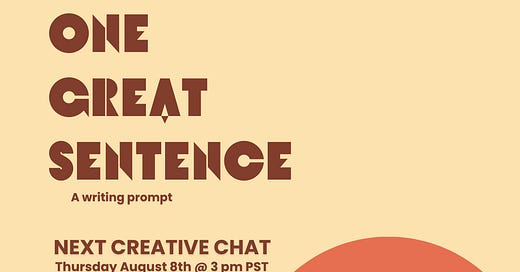Last night I taught an in-person class where each student pulled a little folded paper from a pile of little folded papers.
Inside was one great sentence.
It wasn’t great like, wow, what poetry! It was great in the sense that something was happening. It referenced some bigger thing we didn’t know about yet. There was tension in that sentence and there a lot to explore with that sentence.
To eliminate bias or give any info that might skew their writing, the writers didn’t get to know what their sentence was from until the end. I selected three very different but very interesting short stories from Sigrid Nunez, Miranda July and Stephen King. I printed the first page of each and cut out a few choice sentences. Below are a few:
“Never mind. It was a bad book and only a so-so movie. Tell me again about this
project of yours.” — “The Cookie Jar,” Stephen King
“This was the last thing you and I talked about while you were still alive. After, only your email with a list of books you thought might be helpful to me in my research.” — “The Blind,” Sigrid Nunez
The doctors who examined the women—about a hundred and fifty in all—found that their eyes were normal. Further tests showed that their brains were normal as well. — “The Blind,” Sigrid Nunez
“I lay still, staring out the window, letting them have their time together. If I
protested, I’d only make his case stronger…” — “The Metal Bowl,” Miranda July
See? Each of those sentences makes you curious about what’s going on in this scene. And the fun part was, the writers got to take it from there and add their own “what’s going on.”
Each writer had ten minutes to start with that one interesting sentence and see where it took the writing. The rules were: see if you can introduce or expand on your narrator’s problem right away, and don’t censor yourself. Allow yourself to suck, as Diana Goetsch says.
The results were incredible. Truly, it was so impressive how interesting each story was, so immediately. The writers read aloud from their pieces, shocked they’d come up with such a thing.
It made me think of a George Saunders quote:
“Who cares if a first draft is good? It doesn't need to be good. It just needs to be, so you can revise it. You don’t need an idea to start a story, you just need a sentence. Where does that sentence come from? Wherever. It doesn’t have to be anything special. It will become something special over time as you keep reacting to it.”
One good sentence is all you need…
While the writers shared, I jotted down some of the set up of their story: the immediacy of the problem they introduced (the tension between two people, inspired by the July quote; the mystery of the eye ailments, inspired by Nunez) and what it made me curious about. Because that one juicy sentence was packed with stuff, it made it easier for the writer to expand around that sentence and write meaningful, interesting stuff around it.
After we read, we took a few minutes to examine each story more closely.
I always ask two questions at the start of a story:
What is the character’s problem?
What will get in the way of them solving it?
More on that later, but for now, I just wanted to share the power of starting off with one interesting, packed sentence.
Jotting time
At the end of class, I held up my little leather notebook and explained that any time I come up with a great (often super random) sentences or an interesting observation, I jot it down in my notebook. Sometimes, when I’m just looking for a new story or to get unstuck from a scene, I’ll go to my random list of interesting sentences and one will strike me and unstick me.
I always recommend carrying around a physical notebook. There’s something different the brain does when you jot a little note, maybe with a doodle, or maybe one word is underlined or written in funny handwriting (not harping on jotting notes in phones; whatever gets you jottin).
Next Creative Chat:
Our next Chat is on Thursday August 8th at 3 pm PST via Zoom. I’ll send the link out to all paid subscribers 1 week and 1 hour ahead of time.
THE THEME: Best feedback you’ve ever been given on a story (general or specific) and a discussion on what would be most helpful to hear in a workshop.
As always, we’ll end with a general Q&A as well, so bring whatever questions & thoughts you have. Looking forward to it!





I didn't find the link for August 8th. I missed the one on July 12th, overlooked the link.
Hope all is well and that you had a good Christmas. Happy New Year, it may it be healthy and prosperous.